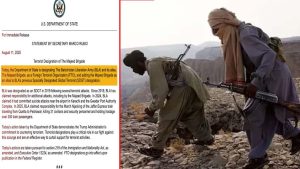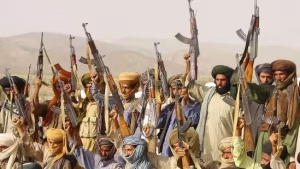Washington D.C. – US Pakistan Relations reached a significant milestone during the Counter-Terrorism Dialogue held in Islamabad on Tuesday, with the United States formally applauding Pakistan’s “continued success” in containing terrorist entities threatening regional and global security. This positive assessment of US Pakistan Relations marks a notable shift in bilateral cooperation on counter-terrorism efforts.
The joint statement released following the dialogue demonstrates renewed confidence in US Pakistan Relations and Pakistan’s commitment to combating terrorism. This diplomatic engagement reflects both countries’ recognition of shared security interests and the importance of sustained cooperation in addressing regional terrorist threats.
American Recognition of Pakistani Achievements

The United States has publicly acknowledged Pakistan’s effectiveness in counter-terrorism operations, with the joint statement emphasizing Pakistan’s “continued successes to contain terrorist entities that pose a threat to the peace and security of the region and the world.” This recognition significantly enhances US Pakistan Relations by validating Pakistan’s security efforts on the international stage.
This positive assessment of US Pakistan Relations comes despite previous tensions and demonstrates America’s appreciation for Pakistan’s strategic role in regional security. The acknowledgment reflects substantial progress in bilateral cooperation and mutual understanding of security challenges.
Condolences for Terrorist Incidents


The United States expressed formal condolences for civilian and law enforcement casualties in recent terrorist incidents within Pakistan, demonstrating empathy and support that strengthens US Pakistan Relations. The American statement specifically mentioned the barbaric Jaffar Express terrorist attack and the school bus bombing in Khuzdar, acknowledging the human cost of terrorism in Pakistan.
These expressions of sympathy within US Pakistan Relations highlight shared vulnerability to terrorist threats and the importance of continued cooperation in preventing such tragedies. The specific mention of incidents demonstrates American awareness of Pakistan’s ongoing security challenges and sacrifices.
Balochistan Liberation Army Designation Context


The positive US Pakistan Relations dialogue occurred just one day after the United States designated the Balochistan Liberation Army (BLA) and its alias, The Majeed Brigade, as a Foreign Terrorist Organisation. This timing demonstrates coordinated efforts to address specific terrorist threats while maintaining productive bilateral engagement.
The BLA designation represents a concrete example of US Pakistan Relations cooperation in identifying and confronting shared security threats. Both countries have previously designated BLA as a terrorist organization, reflecting alignment in threat assessment and counter-terrorism priorities.
Historical BLA Activities and Escalation

The Balochistan Liberation Army has conducted a decades-long insurgency against the Pakistani government, seeking independence for the natural resource-rich province. The organization’s designation as a terrorist entity by both countries demonstrates the convergence of US Pakistan Relations in addressing separatist violence and regional instability.
Also Read: Bold Statement By Ex-Pentagon Official On Asim Munir, Compares Pak Chief To Osama Bin Laden
Secretary of State Marco Rubio noted that since the BLA’s 2019 Specially Designated Global Terrorist designation, the organization has claimed responsibility for additional attacks through The Majeed Brigade. This escalation pattern validates the cooperative approach evident in current US Pakistan Relations.
Strategic Security Partnership Evolution
The Counter-Terrorism Dialogue represents the institutionalization of US Pakistan Relations in addressing shared security concerns through regular diplomatic engagement. This structured approach ensures sustained cooperation and information sharing between intelligence and security agencies of both countries.
The formal dialogue mechanism strengthens US Pakistan Relations by providing consistent channels for coordination on emerging threats and joint response strategies. This systematic approach reflects maturity in bilateral security cooperation despite occasional political tensions.
Army Chief’s Washington Engagement

Pakistan Army Chief Asim Munir’s recent visit to Washington demonstrates the military dimension of US Pakistan Relations and high-level engagement between defense establishments. This marked Munir’s second visit to the United States since regional conflicts, indicating sustained military-to-military cooperation despite broader political challenges.
During his Washington visit, Munir engaged with senior political and military leadership, reflecting the importance of personal relationships in maintaining US Pakistan Relations. These high-level interactions provide essential foundations for operational cooperation and strategic coordination.
Diaspora Engagement and Community Relations
Army Chief Munir’s interactions with members of the Pakistani diaspora during his Washington visit highlight the people-to-people dimension of US Pakistan Relations. These community engagements demonstrate recognition of Pakistani-American contributions to bilateral relationships and the importance of diaspora communities in strengthening ties.
The inclusion of diaspora engagement within official visits reflects the comprehensive approach to US Pakistan Relations that extends beyond government-to-government interactions to include civil society and community connections.
Regional Security Implications
The strengthening of US Pakistan Relations through counter-terrorism cooperation has significant implications for regional stability and international security. Pakistan’s strategic location and security capabilities make it a crucial partner in addressing threats emanating from South Asia and the broader region.
Effective US Pakistan Relations contribute to stability in Afghanistan, counter-terrorism efforts against various organizations, and broader regional security architecture. The bilateral cooperation demonstrated in the Islamabad dialogue reflects shared recognition of these strategic imperatives.
Future Cooperation Prospects
The positive trajectory evident in recent US Pakistan Relations suggests potential for expanded cooperation beyond counter-terrorism to include economic development, regional stability, and strategic coordination. The foundation established through security cooperation could facilitate broader partnership development.
The joint statement’s tone and substance indicate that US Pakistan Relations have overcome previous periods of tension and mistrust to establish productive working relationships. This progress creates opportunities for addressing additional shared challenges and expanding the scope of bilateral cooperation in various sectors affecting regional and global security interests.

